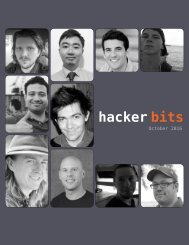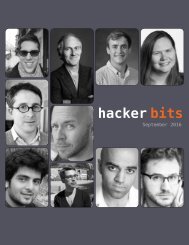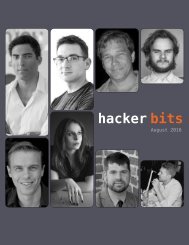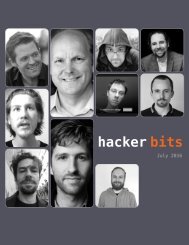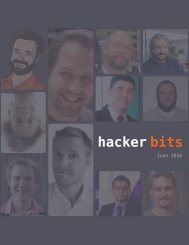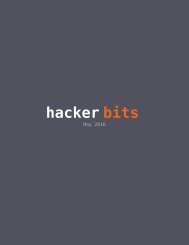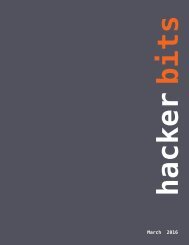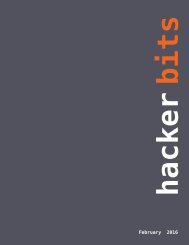Hacker Bits, April 2016
HACKER BITS is the monthly magazine that gives you the hottest technology and startup stories crowdsources by the readers of Hacker News. We select from the top voted stories for you and publish them in an easy-to-read magazine format. Get HACKER BITS delivered to your inbox every month! For more, visit http://hackerbits.com.
HACKER BITS is the monthly magazine that gives you the hottest technology and startup stories crowdsources by the readers of Hacker News. We select from the top voted stories for you and publish them in an easy-to-read magazine format.
Get HACKER BITS delivered to your inbox every month! For more, visit http://hackerbits.com.
Create successful ePaper yourself
Turn your PDF publications into a flip-book with our unique Google optimized e-Paper software.
Programming<br />
How to pass<br />
a programming interview<br />
By AMMON BARTRAM<br />
Being a good programmer<br />
has a surprisingly small role<br />
in passing programming<br />
interviews. To be a productive<br />
programmer, you need to be<br />
able to solve large, sprawling<br />
problems over weeks and<br />
months. Each question in an<br />
interview, in contrast, lasts less<br />
than one hour.<br />
To do well in an interview,<br />
then, you need to be able to<br />
solve small problems quickly,<br />
under duress, while explaining<br />
your thoughts clearly. This is a<br />
different skill. On top of this,<br />
interviewers are often poorly<br />
trained and inattentive (they<br />
would rather be programming),<br />
and ask questions far removed<br />
from actual work. They bring<br />
bias, pattern matching, and a<br />
lack of standardization.<br />
Running Triplebyte, I see this<br />
clearly. We interview engineers<br />
without looking at resumes, and<br />
fast-track them to on-sites at YC<br />
companies. We’ve interviewed<br />
over 1,000 programmers in the<br />
last nine months. We focus heavily<br />
on practical programming,<br />
and let candidates pick one of<br />
several ways to be evaluated.<br />
This means we work with many<br />
(very talented) programmers<br />
without formal CS training. Many<br />
of these people do poorly on interviews.<br />
They eat large sprawling<br />
problems for breakfast, but<br />
they balk at 45-min algorithm<br />
challenges.<br />
The good news is that<br />
interviewing is a skill that can<br />
be learned. We’ve had success<br />
teaching candidates to do better<br />
on interviews. Indeed, the quality<br />
that most correlates with a<br />
Triplebyte candidate passing interviews<br />
at YC companies is not<br />
raw talent, but rather diligence.<br />
I fundamentally do not<br />
believe that good programmers<br />
should have to learn special<br />
interviewing skills to do well on<br />
interviews. But the status quo<br />
is what it is. We’re working at<br />
Triplebyte to change this. If<br />
you’re interested in what we’re<br />
doing, we’d love to have you to<br />
check out our process. In the<br />
meantime, if you do want to get<br />
better at interviewing, this article<br />
describes how we think you<br />
can most effectively do so.<br />
12 hacker bits








